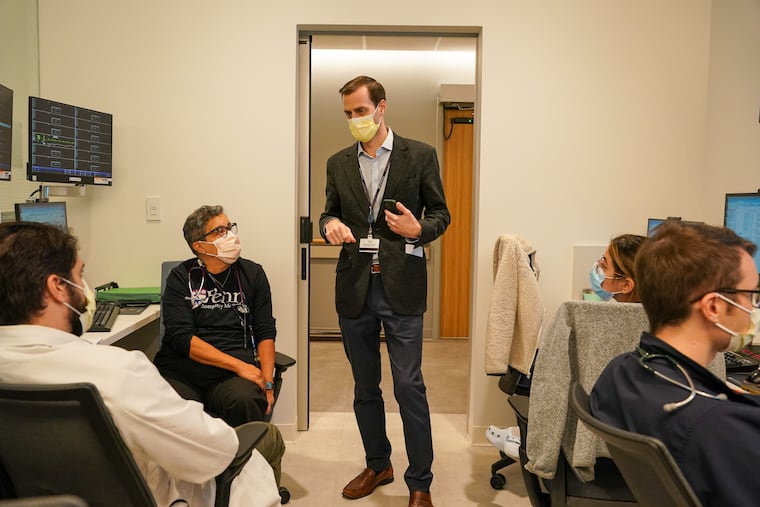You may soon be able to stop masking to enter Philly hospitals
“COVID is going to be here forever. It’s never going to go away,” Jonathan Stallkamp of Main Line Health said.

Philadelphia’s Board of Health is considering relaxing mask requirements in health facilities, as health systems across the region are rethinking their own policies.
The Inquirer surveyed health systems with hospitals in Philadelphia, the city’s Pennsylvania suburbs, and South Jersey.
One, St. Luke’s University Health Network, which operates hospitals in the Lehigh Valley and Bucks County, relaxed masking requirements for their Pennsylvania hospitals in March 2022.
Others have relaxed their policies more recently.
Virtua Health changed its policy in March of this year and no longer requires employees or visitors to wear a mask in common spaces in its five New Jersey hospitals. Employees are required to wear masks when interacting with patients.
Cooper University Health Care, also in New Jersey, and Crozer Health in Delaware County are transitioning to a similar policy this week.
» READ MORE: Biden ends COVID national emergency after Congress acts
Most health systems in the area — Jefferson, Main Line, Penn, Prime, Redeemer, Temple, Tower, and Trinity — as well as the Children’s Hospital of Philadelphia and St. Christopher’s Hospital for Children, continue to require masking in all areas accessible to patients.
But some systems are considering changes.
Are masks still required in Philadelphia hospitals?
Philadelphia hospitals don’t have much choice right now. City regulations mandate that all people who enter hospitals — and any other health-care setting, including outpatient clinics and nursing homes — wear a mask.
The city is considering updating those rules in the coming weeks. A proposed change would require masks only for health-care workers when directly interacting with patients, Cheryl Bettigole, Philadelphia health commissioner, said via email.
On Thursday, the Board of Health will hear public comment on the proposal to relax the requirement. The department may change its proposed regulation based on public feedback, Bettigole said.
John Zurlo, director of the infectious disease division at Jefferson Health, thinks the change is reasonable. Jefferson currently requires universal masking across the health-care system.
“There are some in the health-care community who say masks should be a new universal precaution,” he said. “I think that’s a bit extreme.”
Jefferson administrators are still figuring out what their mask policy will look like in the future, Zurlo said. He would like Jefferson’s mask policy to be flexible to meet the needs and risk-level of individual patients. For instance, Zurlo suggests eventually allowing physicians to order masking when treating specific patients.
He also worries that masking compromises elements of the provider-patient interaction.
Last fall, the Centers for Disease Control and Prevention stopped recommending universal masking in health-care settings where community transmission is not high.
At Main Line Health, which operates hospitals in Chester, Delaware, and Montgomery Counties, chief medical officer Jonathan Stallkamp continues to monitor transmission rates for COVID across the region to inform the system’s mask policy. The health system requires masks in all areas of the hospital that patients have access to out of a recognition that many who enter their doors have weakened immune systems.
But like Zurlo at Jefferson, Stallkamp foresees changes to mask policies in the near future.
“COVID is going to be here forever. It’s never going to go away,” he said. “But do we always mask at every single level? The answer is no,” he said.
» READ MORE: What does the end of the pandemic public health emergency mean for you
A new phase in pandemic response
Mask policy updates are among the many ways health systems are beginning to roll back COVID-19 policies.
About a month ago, Main Line Health stopped testing every admitted patient for COVID-19 if they are asymptomatic or have no known exposure, Stallkamp said.
At Jefferson, Zurlo envisions the health system not requiring COVID-19 vaccination for administrative employees who do not interact with patients at all.
While many people have long abandoned their masks, others are concerned about the changes.
“Since the onset of the pandemic, we feel that people with disabilities are an afterthought,” said Germán Parodi, co-executive director of the Partnership for Inclusive Disaster Strategies, a Philly-based disability-led disaster response nonprofit.
Parodi believes that the city and country will regret relaxing masking requirements in health-care settings, pointing to the threats of long COVID and emerging variants. He is also worried that without masking in waiting rooms and clinic hallways, more people with disabilities will be afraid to seek the care they need.
» READ MORE: With help from Philly, disabled Ukrainians seek escape from war
The disability advocate was hospitalized twice in Jefferson hospitals during the pandemic for issues unrelated to COVID. He received great care and felt safe, he said.
“I had a mask on at all times, and so did the health-care workers,” Parodi said. “I didn’t feel the lack of treatment, of understanding, at all.”